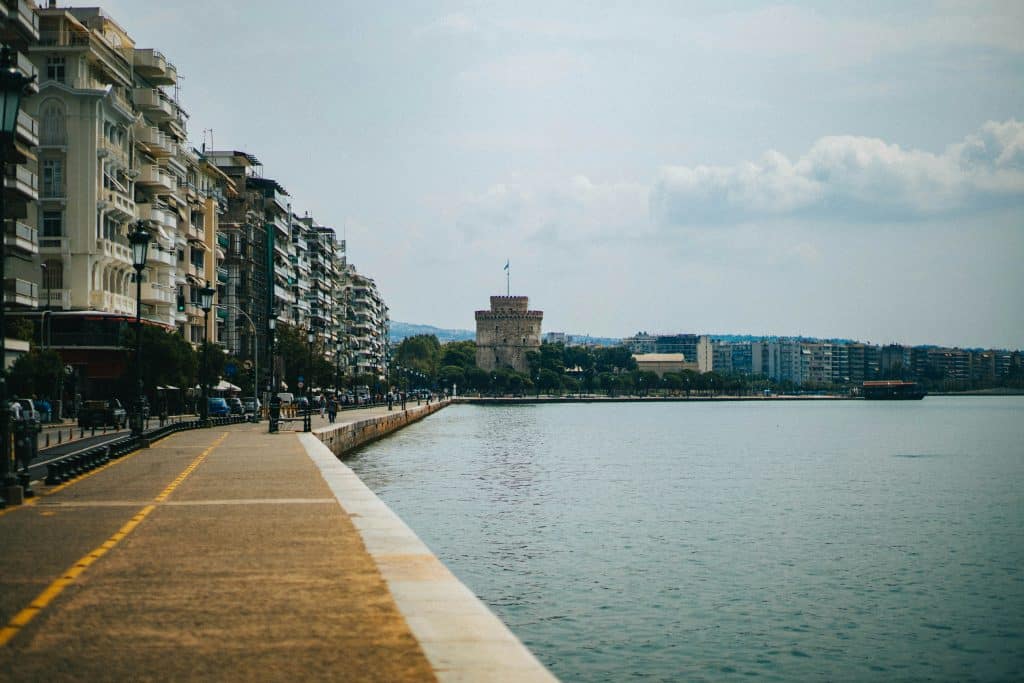Have you fallen in love with Greece, its Mediterranean climate, its relaxed lifestyle and its ancient ruins? Can’t imagine living anywhere else? Well, you are not alone – over 750,000 expats have made the same choice! Whether you’re planning to move alone or with your family, there are some local specifics you should know before relocating.
What administrative formalities do you need to complete? Where should you live? How much money will you need to live comfortably? Foyer Global Health offers its best advice in this comprehensive guide to help you make a success of your move to Greece.
Living in Greece: the pros and cons
Pros
- An ideal climate for enjoying the sun most of the year
- A warm and welcoming population
- Renowned and generous cuisine
- Affordable cost of living
- An advantageous tax system for expatriates, particularly retirees
- A rich culture, with 19 UNESCO World Heritage Sites
Disadvantages
- You have to contend with large numbers of tourists, especially in summer
- The language barrier can be a hindrance, given that the official language is Modern Greek … but the good news is that English is widely spoken!
- Bureaucracy can sometimes complicate and prolong certain procedures
Administrative procedures for moving to Greece
All citizens of the European Union and Switzerland can settle in Greece without a long-stay visa. A valid identity card or passport is sufficient.
Once there, three steps must be taken within three months of arrival:
- Register with the immigration office to obtain a registration certificate valid for five years. This can be done at the police station in your place of residence. You will need to provide several documents, including proof of identity, proof of accommodation and proof of income.
- Obtain a Greek tax number (AFM or ‘afimi’), which is essential for opening a bank account, working or buying property. The application can be made at the nearest tax office.
- Apply for a Greek social security number (AMKA) directly at a KEP (Citizen Service Centre) office.

We recommend that you complete these formalities as soon as you arrive, as each one can take up to a month.
Where to live in Greece?
In Athens, the capital

Living in Athens is the choice of the majority of expatriates, and for obvious reasons. The Greek capital is the economic and cultural heart of the country, with plenty of job opportunities and an ideal living environment.
The city can boast of being one of the oldest in the world, overlooked by the Acropolis and bordered by the Aegean Sea. Its neoclassical neighbourhoods are home to a lively urban life.
In Thessaloniki
Thessaloniki is Greece’s second largest city in terms of population, but also a major industrial and commercial centre, supported by its port. It attracts many expats, drawn by its quality of life, stable job market and cultural life.
Due to its northern location and mountainous surroundings, Thessaloniki enjoys a more temperate Mediterranean climate than Athens, with fairly cold winters and often humid summers.

Average rent in Greece
The average rent for a studio in Greece is £430 per month, and a three-bedroom apartment is £645 per month. In terms of property prices, the average price per square metre in the city centre is £2400, compared to £2,000 in the suburbs.
It should be noted that rents in central Athens remain slightly higher than the national average. You can expect to pay around £430per month for a studio and £645 for a three-bedroom apartment.
Greek prices are affordable compared to some European countries, largely due to the financial crisis that hit Greece in 2008.
Since then, the sector has been gradually recovering, but property prices remain favourable for expatriates. Their salaries are often higher than the national average, which increases their purchasing power and facilitates property investment.
The cost of living
The monthly budget for an expatriate living alone is £990 per month, and for a family of four, it is £2 970 per month. This includes the main items of expenditure, namely rent, groceries, education, healthcare, monthly bills and leisure activities.

How much do you need to earn to live comfortably in Greece?
The average salary in Greece is £15 200 gross per year, or £1 260 gross per month. This salary allows a single person to live comfortably.
However, families generally need two incomes or a higher salary. This is often the case for expatriates working for international companies or in senior positions.
Cost of living compared to other European countries
The cost of living in Greece is on average 33% lower than in the cost of living in the UK, including rent. However, purchasing power is higher in the UK.
Compared to Italy, the cost of living in Greece is also 15% lower on average. However, Greece is more expensive than some of its neighbouring countries: 20% more expensive than Turkey and 22% more expensive than Bulgaria.
Working in Greece

With an unemployment rate of 8.7% in January 2025, Greece does not offer as many professional opportunities as some other European countries. The minimum wage was recently raised to €830 per month.
However, several sectors are booming, and skilled expatriates are often favoured by recruiters, particularly in large companies.
Sectors that are hiring include:
- Tourism (catering, hospitality, cultural venues)
- Commerce
- Construction
- Renewable energy
- Technology
- Services
Working hours
In Greece, people work an average of 39.8 hours per week, which is higher than the European average of 36 hours. Since July 2024, some companies have been allowed to offer working weeks of up to 48 hours.
Taxation for expatriates
You can file some of your tax returns directly online via the TAXISnet platform.
In recent years, Greece has introduced a relatively attractive tax regime for expatriates. Income tax is calculated on a progressive scale, ranging from 0 to 44% depending on the bracket. The country also offers pensioners a favourable tax regime with a single rate of 7% on all income from abroad, including pensions.
French citizens benefit from a double taxation agreement between France and Greece. This prevents them from being taxed twice on the same income.
Getting around like the Greeks
KTEL buses are the most commonly used form of public transport in Greece. Taxis are also very common, especially in Athens. Trains run on a limited network and are sometimes quite basic. Cars remain very popular thanks to a well-developed road network that covers the whole country.
Schooling for your children in Greece
Family life in Greece is punctuated by numerous activities, weekends on the Mediterranean coast and an education system offering several options. Parents can send their children to public or private schools, whether Greek, French or international.
Among the best international schools in the country are:
- Byron College
- Campion School
- ACS Athens (American Community Schools)
- German School of Athens
Health insurance in Greece
The Greek healthcare system is based on a national insurance scheme, supplemented by private insurance. To benefit from this universal system, you must have contributed the equivalent of at least 50 days of work during the year preceding the care.
It should be noted that public healthcare can suffer from long queues and public infrastructure is sometimes lacking in modernity.
This is why expatriates are advised to take out international private health insurance. This allows faster access to quality care in the facilities of their choice.
This cover is generally more comprehensive, including dental and eye care, as well as an emergency repatriation option.
Essential things to do for expatriates
- Go to the beach, of course! There is plenty to choose from: Shipwreck Bay, Balos Beach, Myrtos Beach, Red Beach… how could you get bored?
- Visit the many historical sites in Athens: the Acropolis, the Temple of Zeus, the Odeon of Herodes Atticus, the Theatre of Dionysus, the Agora, etc.
- Discover the most typical neighbourhoods of Thessaloniki, including Ano Poli and Ladadika.
- Visit some of the Greek islands, because unless you have a lot of time, it will be difficult to explore more than 1,200 of them! Make Corfu, Sifnos, Santorini, Rhodes, Spetses Island and the unmissable Mykonos your top priorities.
